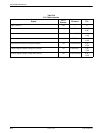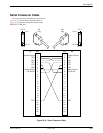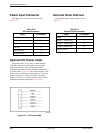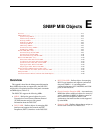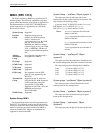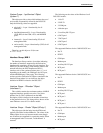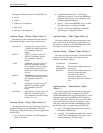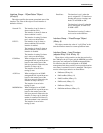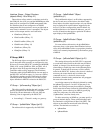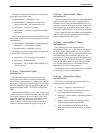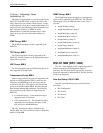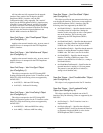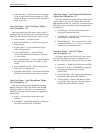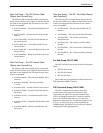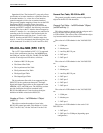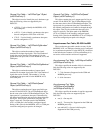
ACCULINK 316x DSU/CSU
E-6 January 1997 3160-A2-GB21-50
Interface Group – Output Counters
(objects ifEntry 16 to ifEntry 21)
These objects collect statistics on the data received by
the COM port, the AUX port, and the MODEM port when
these ports are configured as SNMP management links.
For interfaces that are not configured as an SNMP
management link, these statistics are not provided and an
error status is returned if access is attempted. The objects
used to collect output statistics are listed below:
• ifOutOctets (ifEntry 16)
• ifOutUcastPkts (ifEntry 17)
• ifOutNUcastPkts (ifEntry 18)
• ifOutDiscards (ifEntry 19)
• ifOutErrors (ifEntry 20)
• ifOutQLen (ifEntry 21)
IP Group, MIB II
The IP Group objects are supported by the DSU/CSU
for all data paths which currently are configured to carry
IP data to or from the DSU/CSU, including the MODEM,
COM, AUX, carrier SNMP bus, EDL, and FDL. All of
the objects in the IP Group other than the IP Address
Translation table are fully supported. The IP Address
Translation table (ipNetToMediaTable) does not apply to
the DSU/CSU and will be empty (i.e., have zero entries).
The following sections provide clarification for objects
contained in the IP Group when it is not clear how the
object definition in MIB II is related to the DSU/CSU.
IP Group – “ipForwarding” Object (ip 1)
This object specifies whether the unit is acting as an IP
gateway in respect to the forwarding of a datagram
received by, but not addressed to, this unit. Only the
following value is supported by the DSU/CSU.
• forwarding(1) – The unit is acting as a gateway.
IP Group – “ipAddrTable” Object (ip 20)
The address table is supported by the DSU/CSU.
IP Group – “ipAdEntAddr” Object
(ipAddrEntry 1)
The ipAdEntAddr object is an IP address supported by
the device and serves as the index to the address table.
Since indexes for tables must be unique, only one ifIndex
may be displayed for each IP address supported by the
device. If you have configured the same IP address for
multiple interfaces or for default IP addresses, you will
not see all interfaces that support a particular IP address
upon display of the ipAddrTable.
IP Group – “ipAdEntIfIndex” Object
(ipAddrEntry 2)
For some address table entries, the ipAdEntIfIndex
object may have a value greater than ifNumber. In these
cases, the ipAdEntIfIndex refers to a proprietary interface
which is not currently implemented by the interface group
of MIB II.
IP Group – “ipRouteTable” Object (ip 21)
The routing table used by the DSU/CSU is supported
as a read/write table. Entries in this table may be added,
deleted, or changed. You should exercise great caution
when adding or modifying routes in the ipRoutingTable.
In general, it should not be necessary to add or modify
routes in the DSU/CSU. In those cases where it is deemed
necessary, the routes should only be added to the
connected device (i.e., the device closest to the
destination). Internal routing mechanisms will propagate
the route to the other devices.
An existing route may be effectively deleted by setting
the ipRouteType object to “invalid” for the entry to be
deleted. An existing route may be modified by changing
fields in the desired entry (indexed by ipRouteDest) of the
routing table. A new route may be added by specifying
values for a table entry for which the index
(“ipRouteDest”) does not already exist.
To add a route using an SNMP set, you must specify a
group of minimal objects. These variable bindings must
be contained in a single Protocol Data Unit (PDU). The
objects are described in more detail in the following
sections. The minimal set consists of:
• ipRouteDest
• ipRouteIfIndex



